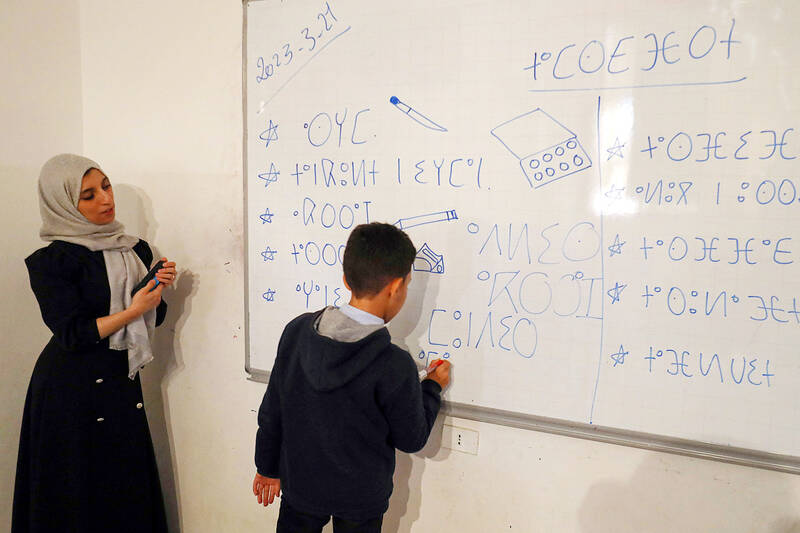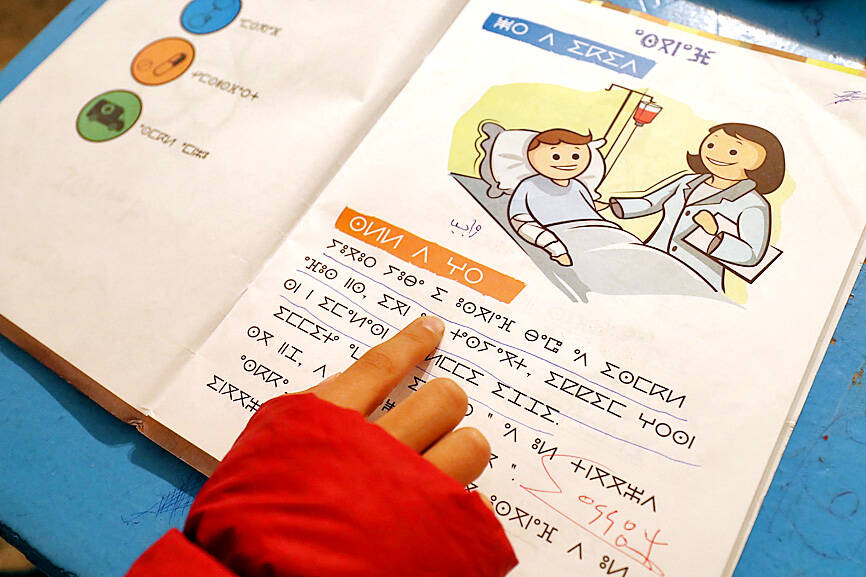A pupil shyly approached the whiteboard, picked up a marker and carefully traced a letter from the Berber alphabet as the teacher watched — a scene unimaginable under former Libyan leader Muammar Qaddafi.
Tamazight has been the native language of indigenous people across North Africa since pre-Roman times. It has survived despite centuries of Arab domination and has undergone a revival in Libya since Qaddafi’s four-decade rule ended in a 2011 revolution.
In the city of Zuwara, a majority-Berber community near the border with Tunisia, teacher Assirem Shawashi encouraged her nine-year-old pupils to approach the board, one by one, to draw out symbols.

Photo: AFP
“Children love this subject because they find their identity and their culture in books,” said Shawashi, dressed in a black dress and gray hijab. “It’s not just about the alphabet and vocabulary, but it’s a whole culture we’re passing on to them.”
About 10 percent of Libya’s 7 million people are ethnically Berber.
Qaddafi worked to crush their culture while promoting Arab identity.

Photo: AFP
However, some, especially in the remote western mountains, continued to speak their language at home, out of earshot of the feared secret police.
They include residents of Zuwara, 120km west of the capital, Tripoli, who have held on to their culture throughout Greek, Roman, Arab, Ottoman and Italian rule.
Libya has seen a decade of complex and often violent power struggles since Qaddafi’s fall in a NATO-backed uprising, but authorities in Tripoli have been accommodating toward Berber culture, even providing textbooks — although they have not given the language official status.
Shawashi is a member of the first-ever class to graduate with degrees in Tamazight last year from the University of Zuwara.
Her younger pupils never knew life under Qaddafi, she said.
“It’s just a natural right to learn their mother tongue, and they can’t imagine that anyone would ever ban that,” Shawashi said.
She said that Tamazight textbooks arrived immediately after the revolution, from Morocco where the language is constitutionally recognized.
Since then, the community has made “enormous advances,” she said. “We ourselves are surprised.”
School director Sondoss Saki said the first classes in 2012 had “difficult beginnings,” due to a lack of trained teachers and confusion about which curriculum to follow.
Some parents feared the children would be overloaded, arguing that Arabic and English were a higher priority.
“But the children come here to learn, and their minds are wide open to knowledge,” Saki said confidently, sitting behind her desk where the Libyan and Amazigh (Berber) flags stood side by side.
When classes are over, Shawashi heads off to the studio of Kasas FM, founded in 2012 as Libya’s first local radio station to broadcast in Tamazight. Shawashi, who works as a presenter in her spare time, met program director Ismail Abudib to discuss his upcoming shows on Amazigh literature.
Abudib, a 28-year-old architect in a white shirt and gray blazer, said he sees it as his duty to defend his community’s rights.
Kasas FM is one way of doing that, he said, sitting in front of a small mixing desk in the station’s control booth.
The station covers social issues, culture, religion, entertainment and sport, he said, “all the subjects that interest listeners, in the language they know best.”
“Respecting your language and being proud of your identity doesn’t stop you living with other communities,” Abudib said. “We’re walking forward and not looking back to the times of repression and marginalization. The whole world is full of diversity, and as Libyans we should be able to live together in peace.”

FORUM: The Solomon Islands’ move to bar Taiwan, the US and others from the Pacific Islands Forum has sparked criticism that Beijing’s influence was behind the decision Tuvaluan Prime Minister Feletei Teo said his country might pull out of the region’s top political meeting next month, after host nation Solomon Islands moved to block all external partners — including China, the US and Taiwan — from attending. The Pacific Islands Forum (PIF) leaders’ meeting is to be held in Honiara in September. On Thursday last week, Solomon Islands Prime Minister Jeremiah Manele told parliament that no dialogue partners would be invited to the annual gathering. Countries outside the Pacific, known as “dialogue partners,” have attended the forum since 1989, to work with Pacific leaders and contribute to discussions around

END OF AN ERA: The vote brings the curtain down on 20 years of socialist rule, which began in 2005 when Evo Morales, an indigenous coca farmer, was elected president A center-right senator and a right-wing former president are to advance to a run-off for Bolivia’s presidency after the first round of elections on Sunday, marking the end of two decades of leftist rule, preliminary official results showed. Bolivian Senator Rodrigo Paz was the surprise front-runner, with 32.15 percent of the vote cast in an election dominated by a deep economic crisis, results published by the electoral commission showed. He was followed by former Bolivian president Jorge “Tuto” Quiroga in second with 26.87 percent, according to results based on 92 percent of votes cast. Millionaire businessman Samuel Doria Medina, who had been tipped

Outside Havana, a combine belonging to a private Vietnamese company is harvesting rice, directly farming Cuban land — in a first — to help address acute food shortages in the country. The Cuban government has granted Agri VAM, a subsidiary of Vietnam’s Fujinuco Group, 1,000 hectares of arable land in Los Palacios, 118km west of the capital. Vietnam has advised Cuba on rice cultivation in the past, but this is the first time a private firm has done the farming itself. The government approved the move after a 52 percent plunge in overall agricultural production between 2018 and 2023, according to data

ELECTION DISTRACTION? When attention shifted away from the fight against the militants to politics, losses and setbacks in the battlefield increased, an analyst said Recent clashes in Somalia’s semi-autonomous Jubaland region are alarming experts, exposing cracks in the country’s federal system and creating an opening for militant group al-Shabaab to gain ground. Following years of conflict, Somalia is a loose federation of five semi-autonomous member states — Puntland, Jubaland, Galmudug, Hirshabelle and South West — that maintain often fractious relations with the central government in the capital, Mogadishu. However, ahead of elections next year, Somalia has sought to assert control over its member states, which security analysts said has created gaps for al-Shabaab infiltration. Last week, two Somalian soldiers were killed in clashes between pro-government forces and